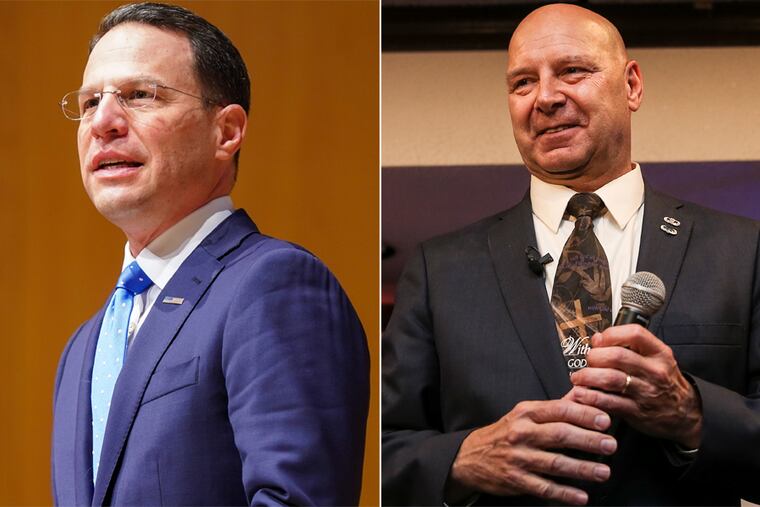In backing extreme opponents, Democrats play a risky game. It could backfire.
Democrats who try to give an edge to a more extreme opponent during primaries are betting on winning in the fall. They shouldn't count on it, given that this strategy often doesn't work.

Last week in Michigan, incumbent Republican Rep. Peter Meijer narrowly lost to his primary challenger, John Gibbs. The main point of contention between the two Republicans was support for former President Donald Trump; Gibbs had Trump’s enthusiastic backing, while Meijer was one of 10 Republicans who had voted to impeach the president after the U.S. Capitol riot on Jan. 6, 2021.
In victory, the conservative challenger had an unlikely ally: the Democratic Congressional Campaign Committee. The DCCC believed that a more extreme Republican nominee would give them a better chance of taking the seat, so while calling the challenger someone who wants to “peddle Trump’s Big Lie,” it also bankrolled him with a $435,000 ad campaign. This is, as Meijer noted in an opinion piece published before the primary, far more support than the amount Meijer says Trump’s own super PAC gave Gibbs: a paltry $5,000.
Why should Trump give more if the Democrats are willing to do his work for him?
Only time will tell if the strategy pays off for Michigan Democrats. Either way, their victory in November is no slam dunk: Michigan’s 3rd Congressional District has not elected a Democrat since 1990. The election there in 2020 was closer than some, but even in that good year for Democrats, Meijer defeated Democrat Hillary Scholten by 6 percentage points. The district’s boundaries changed somewhat in redistricting, but the Cook Partisan Voting Index still rates it as nearly evenly split between Democrats and Republicans.
Now in 2022, as Scholten prepares for a second try at the seat, now against Gibbs, will she do any better? Maybe there are some voters who would have voted for one Republican but not the other. But in these hyperpartisan times, with President Joe Biden’s net approval rating 13 points underwater in the state, it’s just as likely that Democrats are helping replace a moderate Republican with a more conservative one.
Democrats who try to give an edge to a more extreme opponent during primaries are playing a risky game — and it could backfire on them. Including here in Pennsylvania.
Pennsylvania Attorney General Josh Shapiro ran unopposed in the Democratic primary for governor, so he decided to “help” Republicans pick his opponent with an $840,000 ad purchase. Shapiro’s campaign characterized State Sen. Doug Mastriano as “one of Donald Trump’s strongest supporters” — although couched as a warning to voters, a link to Trump is not a negative in a Republican primary.
Mastriano won the GOP primary by a wide margin.
» READ MORE: Josh Shapiro just made it clear which Republican he wants to run against in the Pa. governor’s race
After the primary, the Shapiro campaign sent out mailers, too, delivering the same fake-scary message. (Some of them appeared in my mailbox.) And they displayed the same too-clever-by-half message: Oh, you wouldn’t like this guy, he’s way too conservative.
Mastriano might have won anyway — he was on top in many polls and had Trump’s (albeit last-minute) endorsement, not to mention a sizable statewide following that grew from his Facebook live videos during the COVID-19 lockdowns. But Shapiro’s “warnings” surely helped consolidate the undecided conservatives around him.
Shapiro and the Pennsylvania Democratic leadership got what they asked for. But will they get what they want?
Hillary Clinton’s 2016 campaign team famously believed that Trump as an opponent offered them the best chance to win by focusing the campaign on their base with just a “dash of outreach” to centrist Republicans who feared a Trump presidency, according to Jonathan Allen and Amie Parnes, the authors of a 2017 book on that campaign.
We recall how that worked out.
Republicans can be guilty of the same mistakes. I remember the 1999 Philadelphia mayoral primary, in which many Republicans hoped fervently that Democrats would nominate John Street — then seen as a polarizing figure — rather than one of his main opponents, John White and Marty Weinberg. The presumptive Republican nominee, Sam Katz, even ran ads against White and Weinberg.
“Republicans can be guilty of the same mistakes.”
Katz and the GOP got what they asked for — Street was nominated — but not what they wanted: The Democratic City Council president defeated the Republican businessman by just over 7,000 votes.
What Shapiro has done in Pennsylvania and what the Democratic Congressional Campaign Committee did in Michigan is particularly disingenuous given their rhetoric about what it would mean for the country if the Republicans they helped nominate would win their elections in November. If they truly believed that democratic government itself is at risk, why engage in tactical gamesmanship? Is this an existential crisis or not?
Democrats are playing the same games in Maryland, where the Democratic Governors Association spent nearly $2 million in the Republican primary to help nominate the most right-wing candidate in the race: a man who was also involved in the Jan. 6 riot. Democrats did the same in Illinois, spending $30 million against a moderate Republican mayor from Aurora in the hopes of nominating his far more conservative opponent. In both cases, as in Pennsylvania and Michigan, the scheme worked.
In the long term, this all calls the primary process itself into question. In the short term, it just shows us what a dangerous and disingenuous game Democrats are playing.
Kyle Sammin is editor-at-large at Broad + Liberty.